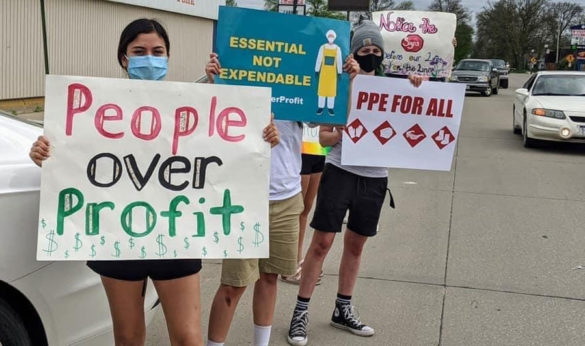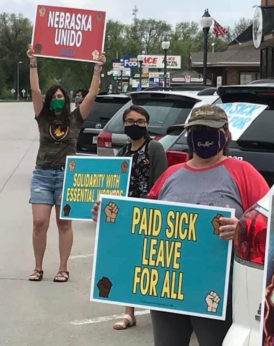
As new COVID-19 infections surge to their highest levels since April, the deadly virus continues to ravage meatpacking plants across the nation. Companies are not implementing CDC guidelines for safe working conditions, so workers, their children, and union are finding ways to resist and demand action.
The gruesome work of killing, cleaning, and deboning beef, pork, and chickens in massive factory operations were already among the most dangerous jobs before the COVID-19 pandemic. Since March, nearly 100 meatpacking workers have died from COVID-19, and another 28,000 have tested positive. But true figures are hard to know since the companies and many state health departments are withholding data.
Because the industry is heavily immigrant, Latinx, and other workers of color, these groups have suffered disproportionately. In Douglas County, Nebraska, home to Omaha, half of all COVID-19 infections are in the Latinx community, many of whom work in the plants.
Still working elbow to elbow
After the initial COVID-19 outbreak, companies handed out hair nets for protection. Workers protested, including organizing some walkouts. They were backed by their union, the United Food and Commercial Workers Union (UFCW), which represents about 800,000 meatpacking workers.
In response, companies installed plexiglass partitions, foot pedals on doors, hand sanitizer stations, plastic face shields in addition to actual masks, and carried out limited testing. But that’s about it. “Social distancing is a nicety that makes sense only for people with laptops,” arrogantly wrote Smithfield CEO Kenneth Sullivan to Gov. Pete Ricketts (R-Neb.).
The meatpacking industry resisted further safety measures because it cut into their profit margins. With restlessness growing among workers, the companies pressured Trump to invoke the Defense Production Act in late April to keep plants open and quell resistance.
Trump invoked the DPA without mandating safety measures recommended by the CDC, OSHA, and in Nebraska, by the University of Nebraska Medical Center. In the “dead of night” in late April, Trump granted waivers to poultry companies to increase line speeds.
“It’s unfathomable that the administration is still not requiring meatpacking plants to implement the latest CDC recommendations. Without these necessary and common-sense protective measures, COVID-19 will continue to spread in these plants and the communities around them,” said Debbie Berkowitz, of the National Employment Law Project.
Gov. Ricketts, scion of one of the nation’s wealthiest families and major backer of Trump, claims enforcing guidelines is a federal matter and refuses to impose them on the state’s largest companies, among them the meat processing industry. But Nebraska ACLU legal and policy counsel Rose Godinez says the state “has the statutory power to conduct inspections and to request federal enforcement.”
Gov. Ricketts is concealing test results and Nebraska is one of five states that won’t release data on the race of those infected and of those who die.
“None of this is uniform,” Eric Reeder, president of UFCW Local 293, recently told Net News. “We were negotiating with each plant, so we ended up with this hodgepodge. Every location is different in some way.
“Unless you lay off workers and slow the line speeds down, it’s very difficult to separate actually on the line. At times, production takes a primary focus over work safety,” said Reeder.
Consequently, workers are still toiling under dangerous conditions, working long shifts and “elbow to elbow,” with production line speeds unchanged, and without adequate testing, sick leave or paid time off.
The Smithfield meatpacking plant in Sioux Falls, S.D., is one of the nation’s biggest hotspots. As of early June, over one-third of the workforce was either absent, quarantined, on extended leave because of underlying conditions, or have quit over fears of getting the coronavirus, according to BJ Motley, president of the UFCW local 304A that covers the plant.
The UFCW estimates 30-50% of meatpacking workers were absent from work, and industry production is running at 75% of capacity.
Children of Smithfield

Abandoned by the companies, Ricketts, and Trump administration, the sons and daughters of meatpacking workers are speaking up for their parents. “We felt a responsibility because they were ignored,” Dulce Castañeda, a 26-year- old leader of Children of Smithfield (COS) told People’s World.
“Most of our parents are immigrants and undocumented workers and fear reprisals for speaking out,” said Castañeda. Immigrants and refugees make up 40% of the industry workforce, and 66% in Nebraska. Many, like Castañeda’s father, are immigrants from Mexico. Others are from Guatemala, El Salvador, Peru, Argentina, Uruguay, Cuba, Vietnam, Myanmar, Somalia, Sudan, and the Middle East.
Over half are non-citizens, and many are undocumented.
“Undocumented workers often don’t feel entitled to their rights,” said Castañeda. “Often, they are happy to have a job, especially with all the layoffs. But that shouldn’t come with the cost of risking your life every day.”
Children of Smithfield formed through social media after seeing a group with the same name organizing in Sioux Falls, S.D. The Nebraska group includes students, lawyers, school administrators, stay-at-home mothers, and DACA recipients.
Castañeda is a legal assistant with a law firm. Her father has worked for 25 years as a deboner at the giant Smithfield pork processing plant in Crete, Neb., that employs 2,100. Her mother works in the local school district.
“We are working with UFCW. The local union president reached out, met with us in late April, and offered total support. We did likewise. We are their eyes and ears in different places and share info,” said Castañeda. “Not all plants have a union rep. The Grand Island JBS plant recently hired someone full time, and we hope workers will be inclined to speak with their union.”
COS is allied with Solidarity with Packing Plant Workers, a group that unites activists across Nebraska. Many have parents working for other meatpacking companies. The groups work with the UFCW, ACLU, and others to demand safety protections, sick pay, and extended leave while sharing information with workers and communities in multiple languages.
The groups organize car caravans every Saturday to meatpacking plants and the state capital of Omaha to lend solidarity, fight company misinformation, pressure elected officials, and share their story with the media.
Working longer and harder

After the first COVID-19 outbreak, Smithfield workers organized a walkout. The company prepared to shut the plant down, but then suddenly reversed course. “Just a few hours later, Trump issued an executive (DPA) order. It was no coincidence and hindered the ability of our communities to protect workers,” said Castañeda.
But by May 15, absenteeism was running at 50% at the plant. “We knew people were still testing positive and sent home. Entire departments were shut down. The company redistributes those who were showing up (to ensure the essential kill lines are operating),” she said. “Line speeds have not changed. Because of vacancies, workers are overworked, having to do the work of multiple people,” said Castañeda.
Although he tested negative, Castañeda’s father quarantined for two weeks after exposure to a worker with COVID-19. He suffers from high blood pressure and sleep apnea, making him a high risk for complications.
“At first, when workers were sent home, they weren’t entitled to sick leave. A lot of information from the company circulated by word of mouth, nothing was written,” said Castañeda. “Now they are getting two weeks paid sick leave. Some workers have been out longer with more complications.”
“But we know of workers who are not getting paid sick leave or told they are not entitled to it, even when they show up with test results,” she said. The focus of the group has shifted to help workers fight for their pay.
The companies also subcontract non-union work, including cleaning crews, cafeteria workers, security workers. They are also being exposed to COVID-19. “We want to ensure Smithfield is aware of what is happening in their facilities even if they don’t employ them directly. These are all essential workers,” she said. “Some of the workers are fearful of speaking out because of their immigration status.”
“There’s a lot of lip service when it comes to supporting meat packing plants,” said Erik Servellon with Solidarity with Meat Packing Workers. “Let’s start putting policy behind it, and money into supporting meatpacking plant employees, things like hazard pay, PPE, and safety standards that could help keep them healthy.”












Comments